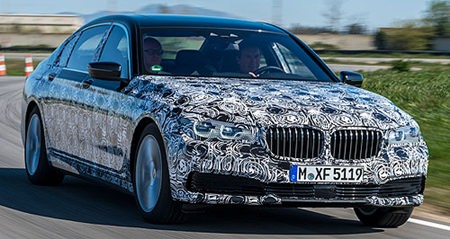Like so many other manufacturers, BMW has subtracted weight from the current 7 Series. Extensive use of carbon-fiber and alloy has been used to cut the car’s weight by up to 130 kg.
Carbon-fiber is used to form the passenger cell but has secondary advantages in increasing the torsional rigidity and strength of the car.
BMW claims with the cell in place, “sheet metal elements can be adjusted accordingly, allowing body weight to be significantly reduced.”
The platform and passenger cell, known as ‘35up’ by BMW, will be used in the future for models from the 7 Series down to the 3 Series.
 2016 BMW 7 Series.
2016 BMW 7 Series.
The exterior of the new 7 Series is very similar to the current 7 which has remained unchanged for the past six years, though it has a longer, wider nose and lower roofline and is very similar to the “Future Luxury Concept” shown at the 2014 Beijing motor show.
Engines will remain similar to current range; however, it is believed that the V12 may be dropped. A plug-in hybrid is likely, with BMW’s heavily committed technology that will first appear on the X5 xDrive40e.
The model will expand its safety equipment, including as standard or optional a more sophisticated Driving Assistant Plus with steering and directional control assistant, Lane Departure Warning Assistant with active side collision protection, and rear collision prevention and cross-traffic warning functions.
The next 7 Series may also have autonomous driving technology for use in some European cities, as the concept of autonomous cars becomes closer to reality. The technology is the result of a recent partnership between BMW and German automotive giant Continental.
BMW also says, “The latest update of the Integral Active Steering system, along with the first electromechanically driven Dynamic Drive roll stabilization system, contribute to a further boost in comfort, dynamic prowess and assurance on the road in the new BMW 7 Series.”
BMW said air suspension will be standard, with a self-levelling function and the company’s electronic Dynamic Damper Control will also be included. “Its electronically controlled dampers improve the primary and secondary ride of the sedan and sharpen its dynamic attributes.”
Much is being said about remote parking, but other manufacturers like Ford already have that, though BMW claims the next 7 Series will be the world’s first volume production car with a remote control parking function, building on the self-parking tech currently available.




